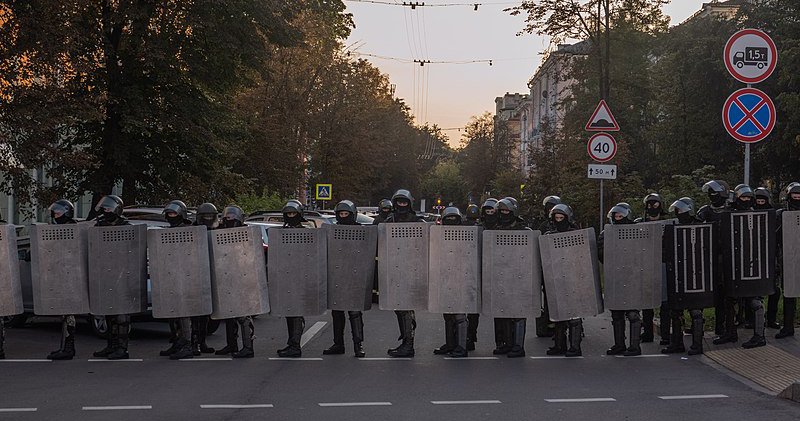In Belarus crackdown, bitter humour to stem the pain

The brutal response to widespread post-electoral protests in Belarus has brought one tragic account after another of violence by security forces and torture in detention. But some Belarusians have been turning to dark humour on Google Reviews to describe a certain facility on Okrestina street, outside of the capital Minsk. Some are rather positive:
“The complex has a wide fleet of vehicles, so they can pick you up from anywhere in the city!” one post says. “I note the comfort of transport; a sauna is built inside, and a team of professional massage therapists is waiting for you! Not surprisingly, the complex is overcrowded, but don't worry, there is a place for everyone!”
“Sleeping on a flat, hard surface is good for your back,” another says. “I slept like a dead man. I will repeat it – it’s great place to relax. You just can't get your friends and family out of there!”
But others reserve their praise, giving it a single star:
“I do not recommend: the wifi does not catch well, the roof is leaking, and the staff is impolite. The atmosphere is somehow unhealthy, it can be loud.”
“The place is so-so. The legs were beaten… but for some reason they did not break. Also, the bruises on the face disappeared in just 10 days instead of 2 weeks.”
If these tongue-in-cheek reviews don’t convince you to stay away from Okrestina, however, you might read our latest report on Belarus.
Former detainees we interviewed described systematic horrors security forces inflicted upon thousands of Belarusians arrested during a four-day crackdown in
August on large scale and largely peaceful protests. People all over the country came out to demand free and fair elections following the contested and likely-bogus August 9 re-election of the incumbent president, Alexander Lukashenko, in power since 1994.
Lukashenko’s use of brute force to stifle the protests did not pay off, as protests grew in size and persisted. But the security forces’ criminal behaviour needs be exposed, denounced, and ultimately punished.
The brave men and women a colleague and I met in Minsk, Hrodna and Homel late last month as we did our research shared disturbingly similar stories. Most had been arrested in the streets while they participated in peaceful protests or just found themselves nearby. They were ferried by police or OMON, the country’s riot police, to various police precincts in vans or buses. Inside, security forces often squeezed up to four of them into small windowless compartments made for no more than two or forced them to lie on top of one another like a stack of cards while beating them and, in some cases, threatening them with rape.
When they arrived at the police stations to be registered, they often had to run through a the “corridor of shame” – a line-up of riot police officers beating them and were forced to stand, kneel, or lie down in courtyards or halls for several hours, without food, toilets, enough water, or the opportunity to call their families or lawyers, all while being beaten if they moved or complained.
And then, often, they’d end up at the Okrestina detention facility, packed into small, overcrowded cells that lacked beds, food and fresh air. Those who were tried, always without a lawyer at their side, described five-minute kangaroo hearings that inevitably ended with a conviction and up to 15 days in detention.
Others were never tried and yet sat in jail for several days. And the nightmare would continue, with more beatings and more abuse, until security forces, overwhelmed by the number of detainees, would release them to free up space for the next batch of unlucky guests.
The scale and brutality of Lukashenko’s repression is shocking, but very real. These are violations that deserve close international scrutiny so that evidence and facts can be collected, assembled in public reports, and used to bring those responsible to account.
The UN Human Rights Council, the UN’s top human rights body, which opened its new regular session on 14 September in Geneva, can do more to press for accountability for those violations. It should send a clear message to Lukashenko and the world that such abuses will not be tolerated and ask the UN high commissioner for human rights to investigate the abuses with an eye towards that goal.
The Google reviews may elicit a wry smile, but a UN report and eventual sanctions could elicit justice.
tinyurlis.gdclck.ruulvis.netshrtco.de
